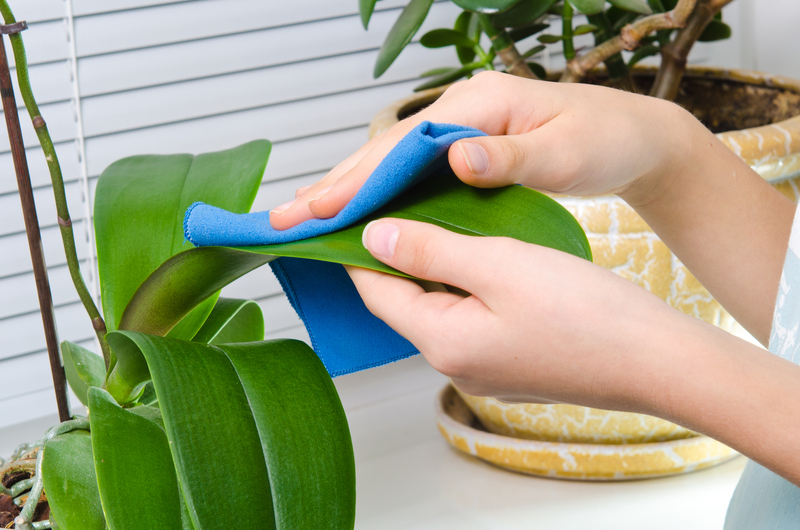Master the Art of Pet Odor Removal for a Fresh Home
Posted on 14/09/2025
Master the Art of Pet Odor Removal for a Fresh Home
Our furry friends bring joy and companionship, but let's face it--pets sometimes come with less desirable side effects, particularly household odors. Luckily, mastering the art of pet odor removal transforms your living space into a fresh, pleasant environment, no matter how many pets you have. This in-depth guide will walk you through the most effective, science-backed, and sustainable methods to keep your house smelling its best while maintaining a pet-friendly atmosphere.
Why Pet Odor Removal Is Essential for Pet Owners
It is not just about pleasant scents--proper pet odor control impacts your home's health, appeal, and longevity. Persistent odors can signal health risks, lead to home damage, and affect your quality of life. Whether you're a seasoned pet parent or considering adopting, understanding pet odor elimination benefits both physical and mental well-being.
- Healthier environment: Pet odors may indicate urine, dander, mold, or bacteria growth, which can trigger allergies and respiratory problems.
- Improved comfort: A clean-smelling home is a welcoming space for you and your guests.
- Asset protection: Eliminating odors prevents stains and corrosion on floors, carpets, and furniture.
- Less stress for pets: Animals are sensitive to their own scents; a clean environment promotes calm behavior.

Understanding the Sources of Pet Odors
To effectively remove pet odors, it's vital to identify where they originate. Here are the most common culprits:
- Urine accidents - Particularly from puppies, kittens, or elderly pets.
- Pet dander and fur - Shed skin cells and hair trap odors and allergens.
- Wet fur - Dogs, in particular, may carry a "wet dog" scent after rain or baths.
- Pet bedding - Hidden bacteria and oils accumulate in beds, blankets, and toys.
- Litter boxes or cages - Improperly cleaned habitats quickly develop strong odors.
Identifying the source is the first step in pet odor eradication and makes your cleaning more precise and effective.
Essential Tools and Supplies for Pet Odor Control
To effectively tackle pet odor removal at home, arm yourself with these key tools and products:
- Enzyme-based cleaners (break down organic stains and odors at the molecular level)
- Baking soda (natural deodorizer for carpets, upholstery, litter boxes, and more)
- Pet-safe sprays (odor neutralizers free from toxic ingredients)
- A high-efficiency particulate air (HEPA) vacuum (captures dander, fur, and particles from air and surfaces)
- Washable covers and throws (protect furniture, easy to launder)
- Black light flashlight (to detect hidden urine stains)
Investing in these supplies will streamline your home deodorizing routine and ensure thorough pet smell removal.
The Step-by-Step Guide to Removing Pet Odors from Your Home
1. Act Quickly on Accidents
The sooner you treat pet stains, the easier it is to remove urine odor and prevent permanent damage. Immediately blot up as much liquid as possible with paper towels or a clean cloth--do not rub, as this spreads the stain.
- For fresh urine spots: Layer paper towels with weight to absorb moisture, then treat with an enzyme-based cleaner designed for pet stains. Allow the product time to break down compounds before blotting dry.
- For older or invisible stains: Use a black light to identify the location, then apply a targeted cleaner following manufacturer instructions.
2. Deep Clean Carpets and Rugs
Carpets can trap countless odors and bacteria. To truly master pet odor elimination for carpets:
- Vacuum thoroughly with a HEPA vacuum to remove hair and dander.
- Sprinkle baking soda liberally across problem areas. Let sit for several hours (or overnight), then vacuum up.
- Steam clean using pet-safe solutions or a rented machine for heavily soiled carpets.
- Call professionals if odors persist; some cases require advanced extraction or treatment.
3. Refresh Upholstery and Furnishings
Sofas, chairs, and curtains readily absorb and hold on to pet smells. Use these strategies:
- Remove and wash slipcovers, pillowcases, and throws weekly.
- For non-washable materials, use a fabric-safe, enzyme-based spray and allow to air dry.
- Regularly vacuum under cushions and along seams where fur collects.
4. Maintain a Pet Odor-Free Hard Floor Routine
While hard floors repel stains better than carpet, they still require regular attention:
- Sweep and mop floors weekly, paying special attention to corners and baseboards.
- Use a mild disinfectant or a pet-safe cleaner to mop up smelly spots.
- Apply white vinegar diluted in water for a DIY deodorizer that is safe for hardwood and tile.
5. Litter Box and Cage Odor Control
- Scoop litter boxes daily and replace the litter entirely at least once per week.
- Clean cages and bedding for small animals several times a week with hot, soapy water.
- Sprinkle a thin layer of baking soda beneath fresh litter for added odor absorption.
- Use a litter deodorizer as needed, but choose baking soda-based or fragrance-free options to avoid disturbing your pet.
6. Wash Pet Bedding, Toys, and Gear Frequently
Your pet's belongings are hotspots for persistent odors. Implement a regular laundry schedule:
- Wash beds, blankets, and soft toys weekly with fragrance-free detergent and hot water.
- Dry gear thoroughly any time it gets wet to prevent bacteria and mildew buildup.
- For items that can't be laundered, use a pet-safe disinfectant spray or wipe down with a vinegar solution.
7. Groom and Care for Your Pets
Clean pets mean a cleaner home! Bathing, brushing, and dental hygiene are crucial for reducing dander and odors at the source.
- Bathe dogs and cats as recommended for their breed and health.
- Brush your pet several times a week to remove shedding fur and distribute natural oils.
- Clean ears and trim nails regularly to prevent buildup of odor-causing bacteria.
- Maintain your pet's dental hygiene; bad breath can contribute to overall odor.
Natural Remedies for Pet Odor Removal
If you prefer chemical-free pet odor remedies or want to supplement store-bought solutions, household staples can make a big impact:
- Baking soda - Absorbs odors in carpets, shoes, and pet areas.
- White vinegar - Cuts through mildew and lingering smells on hard surfaces and laundry.
- Lemon juice - Adds a fresh scent, but ensure pets can't lick treated areas as citrus can be toxic.
- Activated charcoal - Place sachets in target areas to trap airborne odors.
- Sunlight and fresh air - Air bedding and gear outside; UV rays are natural bacteria deterrents.
Always ensure these home remedies are pet-safe and test small areas before wide application.
Tips to Prevent Pet Odors Before They Start
Prevention is the most powerful weapon in your pet odor control toolkit. Create habits that keep smells in check year-round:
- Establish bathroom routines: Take dogs out frequently and provide cats with extra litter boxes.
- Keep up with grooming: Regular brushing and washing reduce shedding and dander.
- Invest in air purifiers: HEPA-filtration systems pull pet hair and odor particles from the air, maintaining overall freshness.
- Use washable covers: Protect sofas and beds with covers that you can launder weekly.
- Monitor your pet's health: Changes in odor can signal underlying health issues--consult your vet if something smells off.
Common Myths About Pet Odor Removal Debunked
There is plenty of misinformation about eliminating pet smells. Let's set the record straight:
- Myth: Air fresheners solve pet odor problems.
Fact: Scented sprays only mask odors. You must remove them at the source for true freshness. - Myth: Bleach is the best pet stain cleaner.
Fact: Bleach is not effective on pet urine and may create toxic fumes. Enzyme-based cleaners are safer and more efficient. - Myth: Cat urine smell is impossible to eliminate.
Fact: While strong, enzymatic cleaners and proper laundering can fully remove cat urine odors. - Myth: Baking soda alone will fix all pet scents.
Fact: Baking soda is a great deodorizer, but for tough smells, you need multiple approaches, including cleaning and disinfection.
Professional Pet Odor Removal Services: When to Call the Experts
Sometimes, despite your best efforts, pet odors persist or worsen. If you experience:
- Long-standing pet urine odors that resist home treatment
- Major "accidents" or extensive soiling of carpets, hardwood, or furniture
- Unidentified sources of unpleasant smells
- Severe allergies or health concerns linked to pet odors
Consider reaching out to a professional pet odor removal company. These experts use commercial-grade enzymatic and ozone treatments to get rid of deeply embedded smells and can restore your home's freshness at a structural level.

Frequently Asked Questions About Pet Odor Removal
- Can you completely get rid of pet odors?
Yes, with prompt action, quality cleaners, and consistent maintenance, you can remove nearly all pet odors from your home. - What's the best cleaner for dog or cat urine?
Look for enzymatic cleaners specifically formulated for pet messes--they break down the proteins and uric acid responsible for persistent smells. - How often should I clean pet bedding?
Ideally, once a week, but more frequently if your pet is messy or has accidents. - Will an air purifier help with pet odors?
HEPA air purifiers with activated carbon filters are effective in trapping odor particles and dander from the air, improving overall air quality.
Conclusion: Embrace a Fresh, Pet-Friendly Home
With diligent cleaning, targeted products, and a bit of patience, mastering the art of pet odor removal is achievable for every pet owner. By identifying odor sources, utilizing effective cleaning agents, adopting preventative routines, and knowing when to seek professional help, your home can remain welcoming, fresh, and sanitary--all while embracing the joy that pets bring.
Remember, a clean and odor-free home is not only possible--it's an essential part of happy, healthy pet ownership. Start using these expert tips today, and enjoy a fresher, more inviting home for you and your beloved pets!
Latest Posts
Jewellery Cleaning Made Simple and Effective
How to Make Your Car Look Showroom-Ready
Unlock the Secrets to a Habitual and Effective Cleaning Routine
Small Wardrobe Transformation: Ideas for Better Organization



